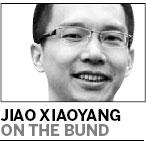Much to the chagrin of believers in "value investing", there's no doubt that a good story alone can move prices.
 The story can be about fundamentals, such as a patent that could increase a drug company's earnings, or it can be an unexpected event like the Chile earthquake that shored up copper prices over the weekend. Or it can simply be a "greater-fool" fantasy that the party is never going to end.
The story can be about fundamentals, such as a patent that could increase a drug company's earnings, or it can be an unexpected event like the Chile earthquake that shored up copper prices over the weekend. Or it can simply be a "greater-fool" fantasy that the party is never going to end.
In a young and volatile stock market like China's, there is no shortage of stories luring speculators onto the wagon and sometimes driving up prices in a spectacular fashion. The interesting thing is that some stories can be recycled and still sell well.
For example, at the end of 2008, shortly after the announcement of the 4-trillion-yuan ($586 billion) stimulus package, the government initiated policies fostering 10 major industries such as steel, automobiles, metals, and electronics.
Stock prices in these industries immediately soared. As the government announced these policies one after another over a period of about six months, companies in related industries took turns starring in the stock market. Many saw share prices triple or quadruple in the first half of 2009, while the Shanghai Composite Index jumped 63 percent.
Recently, as Yogi Berra once said, it's been "dj vu all over again". The buzzword this time: regional development blueprints. On Jan 4 the central government approved a plan to build Hainan, China's southernmost province, into an international tourism mecca.
The market immediately packed its bags. Shares in one local hotel operator, Lawton Development Co, surged from 6.2 yuan to more than 17 yuan between Christmas and the lunar new year on Feb 14.
The story was repeated again around the lunar new year, as a number of similar economic blueprints involving areas such as Tibet, Xinjiang and Chongqing were announced one after another. Companies like Tibet Tianlu, Chongqing Road & Bridge, and Chengdu Commercial Group quickly became heroes in the market.
Many of these companies were beneficiaries of the stimulus a year ago; now they're soaring again on the strength of the regional development story. Doesn't it feel like you bought a Volkswagen Jetta last year and now you're test-driving a Volkswagen Sagita?
The renewable energy sector is another example of recycling. Share prices rocketed at the end of 2008 as Warren Buffett bought into electric car maker BYD, spurring investors to pour money into makers of batteries, wind turbines, valves for nuclear power plants anything that could be connected to the concept of renewable energy. These companies rallied again last week as the media reported that the National People's Congress would take up the "low-carbon economy".
Such stories remind us of the cyclical nature of the market. More importantly, they remind us of the concept of risk. Many of these are good companies, capable of sustained and long-term growth, some are not.
At the rate traders are jumping in and out of them, however, it is unlikely they know the difference.
The current appeal of speculative stories indicates two things. First, liquidity in the market at this point is not enough to shore up blue chip companies, which are the key to the formation of a stable trend.
And second, investors are not sure enough that the recovery is sustainable to invest for the long haul. The Shanghai Composite Index has been treading water for months.
Soon, it is likely to break through, one way or the other. Either way, it won't be good news for buyers of stories.
If the market goes up, blue chips will dominate, while the speculative fever will tend to cool down. If the market goes down, today's high flyers will probably lead the way.
Sooner or later, Chinese traders who are betting on stories will remember Warren Buffett's warning about not swimming naked.
Or, if you're a fan of The Matrix, consider the words of the Oracle: "Everything that has a beginning has an end."
The author is executive business editor of China Daily.





